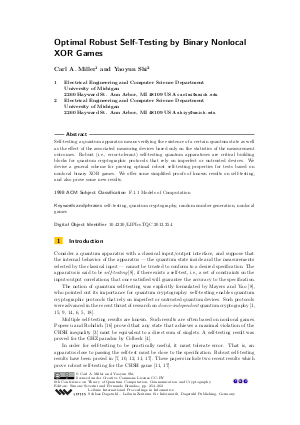Optimal Robust Self-Testing by Binary Nonlocal XOR Games
Authors Carl A. Miller, Yaoyun Shi
-
Part of:
Volume:
8th Conference on the Theory of Quantum Computation, Communication and Cryptography (TQC 2013)
Part of: Series: Leibniz International Proceedings in Informatics (LIPIcs)
Part of: Conference: Conference on the Theory of Quantum Computation, Communication and Cryptography (TQC) - License:
 Creative Commons Attribution 3.0 Unported license
Creative Commons Attribution 3.0 Unported license
- Publication Date: 2013-11-13
File

PDF
LIPIcs.TQC.2013.254.pdf
- Filesize: 400 kB
- 9 pages
Document Identifiers
Subject Classification
Keywords
- self-testing
- quantum cryptography
- random number generation
- nonlocal games
Metrics
- Access Statistics
-
Total Accesses (updated on a weekly basis)
0PDF Downloads0Metadata Views
Abstract
Self-testing a quantum apparatus means verifying the existence of a certain quantum state as well as the effect of the associated measuring devices based only on the statistics of the measurement outcomes. Robust (i.e., error-tolerant) self-testing quantum apparatuses are critical building blocks for quantum cryptographic protocols that rely on imperfect or untrusted devices. We devise a general scheme for proving optimal robust self-testing properties for tests based on nonlocal binary XOR games. We offer some simplified proofs of known results on self-testing, and also prove some new results.
Cite As Get BibTex
Carl A. Miller and Yaoyun Shi. Optimal Robust Self-Testing by Binary Nonlocal XOR Games. In 8th Conference on the Theory of Quantum Computation, Communication and Cryptography (TQC 2013). Leibniz International Proceedings in Informatics (LIPIcs), Volume 22, pp. 254-262, Schloss Dagstuhl – Leibniz-Zentrum für Informatik (2013)
https://doi.org/10.4230/LIPIcs.TQC.2013.254
BibTex
@InProceedings{miller_et_al:LIPIcs.TQC.2013.254,
author = {Miller, Carl A. and Shi, Yaoyun},
title = {{Optimal Robust Self-Testing by Binary Nonlocal XOR Games}},
booktitle = {8th Conference on the Theory of Quantum Computation, Communication and Cryptography (TQC 2013)},
pages = {254--262},
series = {Leibniz International Proceedings in Informatics (LIPIcs)},
ISBN = {978-3-939897-55-2},
ISSN = {1868-8969},
year = {2013},
volume = {22},
editor = {Severini, Simone and Brandao, Fernando},
publisher = {Schloss Dagstuhl -- Leibniz-Zentrum f{\"u}r Informatik},
address = {Dagstuhl, Germany},
URL = {https://drops.dagstuhl.de/entities/document/10.4230/LIPIcs.TQC.2013.254},
URN = {urn:nbn:de:0030-drops-43253},
doi = {10.4230/LIPIcs.TQC.2013.254},
annote = {Keywords: self-testing, quantum cryptography, random number generation, nonlocal games}
}
